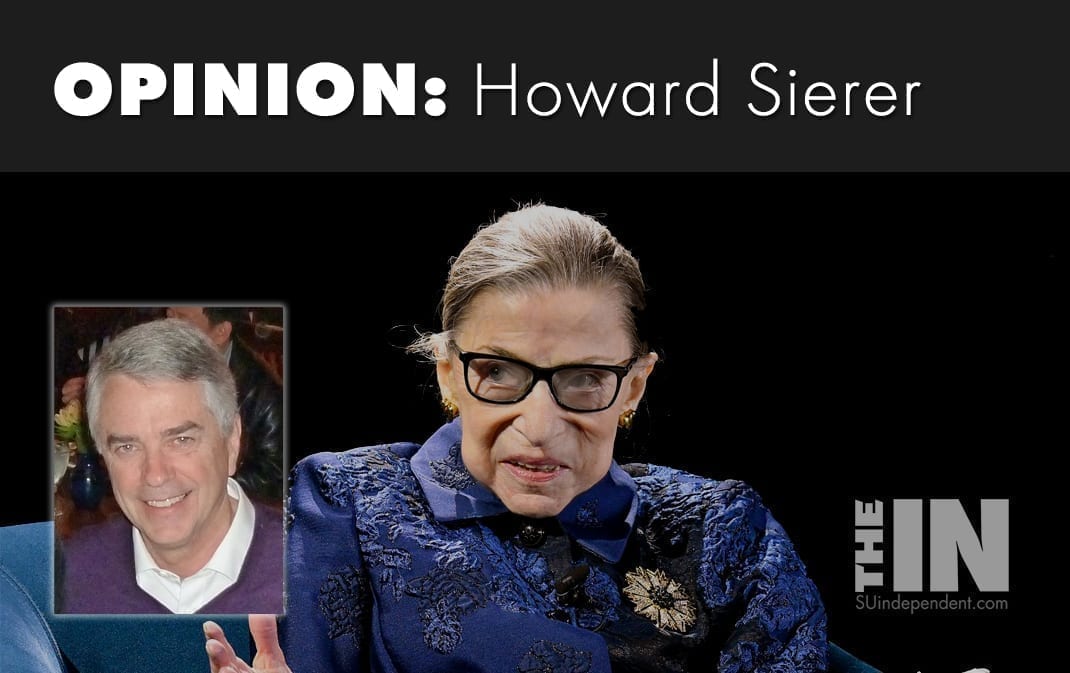
Democrats Make the Case for an Election Year
Supreme Court Confirmation
By Howard Sierer
“There is nothing in the Constitution to stop the president from being President and perform his duties in an election year.”
“Senators refusing to vote on [the president’s] nominee to the Supreme Court should recognize that a president is elected for four years, not three.”
Those words were spoken by none other than the late Ruth Bader Ginsburg as reported in the New York Times and the Washington Post in the summer of 2016.
Using more strident words, President Obama sang the same song in a 2016 HuffPost opinion column: “We cannot tolerate a politically motivated, willfully negligent vacancy on the Supreme Court.”
Sen. Chuck Schumer added to the chorus, “Republicans need to do their job… it’s time for the Senate to do the job we were elected to do.”
All were objecting to Senate Majority Leader Mitch McConnell’s 2016 refusal to consider Obama’s nomination of Judge Merrick Garland to the Supreme Court. But now, with President Trump nominating a replacement for the late Justice Ginsburg, McConnell has promised a Senate vote.
All politicians are hypocrites at some times and to some degree: it comes with the territory. Obama, Schumer and, if she were still with us, Ginsburg would all squirm and wiggle to explain away their earlier statements.
But despite what the liberal media are saying, McConnell is no hypocrite for taking differing positions in 2016 and 2020; instead his actions follow a principle touted by none other than Joe Biden.
In 1992, Biden as chair of the Senate Judiciary Committee warned President George H.W. Bush against making any Supreme Court nominations in that election year. Biden noted that 1992 was different than other election years because with a Republican president and a Democratic Senate majority, “divided government” reflected an absence of a “nationwide consensus” on constitutional philosophy. Biden was clear, “Action on a Supreme Court nomination must be put off until after the election campaign is over.”
Biden was on well-tested ground: The Senate hasn’t confirmed an election-year Supreme Court candidate nominated by a president of the opposite party since 1888.
McConnell stood on that same firm ground in 2016, another year with “divided government.” Now in 2020 with a Republican President and Senate majority, he’s back on the well-trodden path: 21 of 25 times in the nation’s history, the Senate has confirmed a Supreme Court Justice in an election year. Utah’s Sen. Mike Lee and Sen. Mitt Romney agree.
Is September too late to start the confirmation process? President Jimmy Carter didn’t think that November was too late. The week after he lost his 1980 re-election bid, he nominated a close ally of Senate Judiciary Committee Chairman Ted Kennedy to the First Circuit Court of Appeals located in Washington D.C., the so-called “Little Supreme Court” by virtue of the importance of cases heard there.
The nomination sailed through the Democratic-controlled Senate, which confirmed Stephen Breyer less than a month later, six weeks before Inauguration Day. Breyer now sits on the Supreme Court due in no small part to this last-minute confirmation in an election year.
Given their flip flops on Supreme Court nominees, sanctimonious Democrats have no standing to argue now for a “nationwide consensus on constitutional philosophy.” They have and will use any less-than-ethical scheme possible to smear and obstruct justices not to their liking, given how they smeared Robert Bork, Clarence Thomas and more recently, Brett Kavanaugh.
Recoiling from Democrats’ Kavanaugh smear, the nation voted to retain its “nationwide consensus on constitutional philosophy” by reelecting a Republican Senate majority in 2018.
Claiming that liberal judges and justices “uphold the rule of law” is laughable on its face. As I discussed in a previous column, liberals openly espouse the concept of a “Living Constitution,” the antithesis of the rule of law. As described on the uslegal.com website:
“Living Constitution is a term used to describe the Constitution’s ability to change to meet the needs of each generation without major changes. It is based on the notion that the Constitution of the United States has relevant meaning beyond the original text and is an evolving and dynamic document that changes over time. Therefore, the views of contemporaneous society should be taken into account when interpreting key constitutional phrases.”
This “new normal” reminds me of comedian Flip Wilson and his character the Reverend Leroy, pastor of The Church of What’s Happening Now. Wilson’s comedy routine sadly has become all too real as activist judges interpret and reinterpret “law based on what’s happening now.”
It’s become clear this past summer that an emerging progressive consensus considers our nation’s institutions, traditional values and even our history to be fundamentally illegitimate. If Democrats win in November and choose the progressive course, they can expect a 2022 backlash from the American mainstream similar to Obama’s experience in 2010.
Decades of liberal judicial activism have taken contentious social and societal issues out of the hands of elected officials where they belong and made the Court and the judiciary central to American politics.
President Trump committed to nominating originalist judges and justices who read the text of the Constitution and review the legislative record of laws to determine their original intent, not “the views of contemporaneous society,” i.e. a judge’s personal interpretation of social justice. That is the sole reason why many conservatives voted for him; they have not been disappointed.
I’m ready for a justice who honors the Constitution as written, one who truly respects the rule of law. Judge Amy Coney Barrett fills the bill nicely.
Viewpoints and perspectives expressed throughout The Independent are those of the individual contributors. They do not necessarily reflect those held by the staff of The Independent or our advertising sponsors. Your comments, rebuttals, and contributions are welcome in accordance with our Terms of Service. Please be respectful and abide by our Community Rules. If you have privacy concerns you can view our Privacy Policy here. Thank you!
Click here to submit an article, guest opinion piece, or a Letter to the Editor




